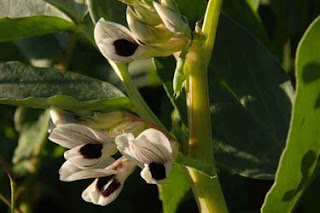(The broad bean plant has lovely flowers)
There is a day of spring and suddenly – zouffff – here is the summer. This year that day has come pretty late; in other years we have already had the first heat wave by now. But now, finally, here it is: the summer! Even though it has made its entrance very slowly. As lovingly received as the summer, are the first fresh beans of the year: koukias (broad beans). Well, to be honest, they were already here many weeks before the summer.
Koukia (Vicia faba), used to be called favas and they were already being eaten some 6000 BC in the Eastern Mediterranean. But they were also used for drawing lots to see who had to fight against who in the ancient Greek games of pankration (a combination of wrestling and boxing). In ancient Greece the seeds of the beans were used to ballot in the parliament: if you gave a black seed you did not agree, if you gave a white seed you did agree with a proposal.
The Greeks even had a special god for the beans: Kyamites. This rather mysterious God who looked after the bean harvest, had his temple on the road from Athens to Eleusis, a spot in Attica where they had celebrations for Demeter, goddess of the harvest.
The famous mathematician Pythagoras (570 – 495 BC) who came from Samos was also a philosopher and a reformer who had plenty of followers. Maybe this group was looked upon as a religious sect because they had serious rules to follow. They were forbidden to wear clothes made from animals, they were not allowed to pick up anything that fell from a table and they were not to eat beans, because Pythagoras thought that our ancestors lived in the beans. Maybe Pythagoras got that from Egypt where he had studied and where they believed that death travelled through the stem of the bean plants to the underworld. At the end of his life Pythagoras lived in Kronos (nowadays Corone in Italy). When the local people revolted against the Pythagorians and their revolutionary ideas, they mobbed their school and Pythagoras fled into a bean field. Here scientists disagree how Pythagoras died: some say that he walked slowly through the bean field because he was afraid to step on the beans and because of this he was caught and murdered. Others say he fled through the bean field, reached a temple where he hid and died from hunger.
In the novel Uncle Petros and Goldbach’s Conjecture from the Greek writer Apostolos Doxiades we also find a combination of beans and mathematics. In the story, Uncle Petros tries to prove Goldbach’s conjecture, which is – that any even number greater than two is the sum of two primes. For this he used (dried) beans that he scattered across his living room floor. Even two years after that the book was published and both the English and the American publishers of the book promised a one million dollar prize for anybody who could solve Goldbach’s conjecture, the problem remains unsolved.
You could say that beans do not bring luck in mathematics, but that they can make you happy ending your hunger. In Holland broad beans are far less popular than here in Greece. When they are fresh, like here on the island, they can be turned into a five star dish. You pick them when they are still small and you cook and serve them in their pods.
When the beans are really big, they are less wanted by the Greeks. But I know better – take those huge beans out of their pods and bake them with some bacon and cream. Another five star dish!
A popular Greek dish, mainly in wintertime, is fava, which can be green or yellow. You might think this is a dish made of broad beans, but it is not. Fava is made with split peas (and sometimes with chick peas). Which is strange, because I have never seen fresh peas on the island. But I have seen thousands of broad beans. And when the bean plants sighbecause of the weight of their heavy fruit, everybody invites you to come and pick the beans. Even though Greeks do not like their beans so big, it is a pity to let them languish on the land. Do the Greeks not know that with double shelled koukia you can make a marvelous kind of fava? You get them out of their pods, you cook them for about five minutes and then you mash them with some pepper, salt, mint, thyme, some lemon juice, olive oil, garlic and finely chopped onion. You sprinkle them with cheese and put them in the oven long enough to melt the cheese: a tasty dish made with ‘fava’ beans not called fava.
Around mid summer, when the very last bean comes from the field everybody is greatly disappointed that the beans’ time has ended and that we have to wait another year for fresh koukia.











